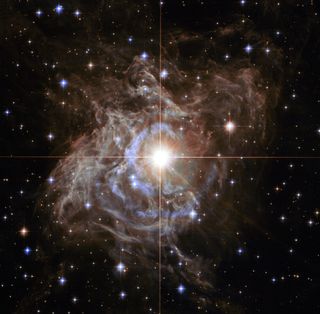How the Universe Stopped Making Sense

A Hubble Space Telescope image shows RS Puppis, one of the brightest Cepheids visible in our galaxy. Astrophysicists use stars like this to calculate the expansion rate of the universe.
(Image: © Hubble Space Telescope/NASA)
We're getting something wrong about the universe.
It might be something small: a measurement issue that makes certain stars looks closer or farther away than they are, something astrophysicists could fix with a few tweaks to how they measure distances across space. It might be something big: an error — or series of errors — in cosmology, or our understanding of the universe's origin and evolution. If that's the case, our entire history of space and time may be messed up. But whatever the issue is, it's making key observations of the universe disagree with each other: Measured one way, the universe appears to be expanding at a certain rate; measured another way, the universe appears to be expanding at a different rate. And, as a new paper shows, those discrepancies have gotten larger in recent years, even as the measurements have gotten more precise.
No comments:
Post a Comment